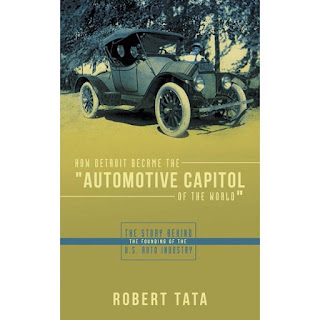Before there was the digital world wide web there was the analog web or what I like to think of as libraries. One book leads to another. You read about a person mentioned in one story and want to know more about them and pick up another book and so on, not knowing where it will lead. Perhaps your subliminal is leading you down a path where you start to develop themes. I had this experience
over the past year and I’ll
call this theme, "Midwest Innovation." I suppose it came from the fact I'd grown up in a rust-belt town that had gone through it's own cycle of build, boom, bust, and transformation.
The journey started with Robert Laceys book
Ford: The Men in the Machine focused on the extraordinary rise of Henry
Ford and his automobile dynasty.
Ford took his inspiration from Thomas
Edison the great inventor who held more patents than any other American
in history. Ford met Edison when he was a young man working in one of Edison's electric dynamo plants. The connection lead me to read Edison Inventing the Century a Biography by Neil
Baldwin.
Both the Ford and Edison books mentioned a series of ten-year of road trips the two took across the United
States that included Harvey Firestone, John Burroughs, a renown naturalist, the occasional President, and others. They called
themselves the Vagabonds that lead to next read book by that title, The Vagabonds by Jeff
Gwynn.
I knew little about Firestone and the rise of the rubber industry, I turned to Wheels of Fortune The Story of Rubber in Akron by Steve Love and David Giffels.
Then I circled back to
read a very concise and useful little book called How Detroit Became the Automotive Capital of the World a self-published book by Robert Tata.
Since Edison and Firestone were both Ohio natives and innovators, I couldn't leave the state without reading about Dayton's most famous residents in the book, The Wright Brothers by David McCullough.
Was there something special about Dayton that fostered the two bicycle mechanics to inspire their innovative spirit? I turned to an academic study of Dayton Ohio: The Rise, Decline and Transition of an Industrial City by Adam Milsap.
Sixty miles down the road from the Wright Brothers was Eddie Rickenbacker, born in Columbus, and an early fan of their airplane. In Ace of Aces, by H. Paul Jeffers, he tells Rickenbacker's story as the successful fighter ace in WWI as well as his career as a race car driver, automotive designer, military adviser and head of Eastern Airlines.
For balance to the inventors and industrialists, I looked to a voice of poetry and literature in Poems of the Midwest by Carl Sandburg and a biography, Carl Sandburg: His Life and Works by North Callahan.
And I couldn't leave Sandburg without reading about Chicago in The Third Coast: When Chicago Built the American Dream by Thomas Dyja.
For a present day perspective, I read a collection of contemporary stories from The Best of Belt Magazine Vol. III with stories
from Chicago, Detroit, Pittsburgh, Minneapolis, and everywhere in
between.
At this point, I thought I'd give the Midwest Innovation theme a restbut over the summer, I read One Summer America 1927 by Bill Bryson, who profiled among other historic events that summer, Detroit, Michigan native, Charles Lindbergh in his historic solo trans-Atlantic flight.
And then, thinking I would finally be safe by retreating to fiction, I read The Plot Against America by
Philip Roth a dystopian novel that portrays an alternative history in which Charles
Lindbergh becomes president of the United States in 1940 as part of a secret plot by
the Nazis to take over the country.
The web of course goes on and I could keep making connections but I'll end here. The web is endless.

















Comments
Post a Comment